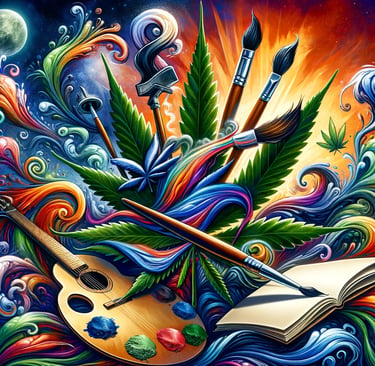Cannabis and Creativity: Beyond the Stereotype
The intersection of cannabis and creativity has long fascinated artists, writers, musicians, and creators across various disciplines. While popular culture often portrays a stereotypical image of the "stoned artist," the reality is much more nuanced and complex. This article explores the relationship between cannabis and creativity, shedding light on personal anecdotes, scientific studies, and the broader implications for creative work.
CANNABIS GUIDE
2/13/20242 min read


The Creative Process Unveiled
Creativity is an elusive concept, often described as the ability to transcend traditional ideas, rules, patterns, and relationships to create meaningful new ideas, forms, methods, and interpretations. Cannabis is said to affect this process by altering perception, enhancing introspection, and allowing for new associations to form more freely.
Anecdotal Evidence
Many prominent figures in art, literature, and music have attributed part of their creative process to cannabis. From the Beatles' experimentation in the 1960s to contemporary artists and writers, cannabis has been credited with providing a shift in perspective that often leads to creative breakthroughs.
Artists: Salvador Dali, known for his surrealistic artworks, and others in the visual arts have mentioned using cannabis as a tool for exploring new aesthetic territories.
Writers: Beat generation writers like Jack Kerouac and Allen Ginsberg celebrated cannabis for its mind-opening effects, influencing their stream of consciousness writing style.
Musicians: Bob Marley and the broader reggae movement used cannabis not only as inspiration but as a spiritual and creative guide.
Scientific Perspectives
Research into how cannabis affects creativity is ongoing, with mixed findings. Some studies suggest that cannabis can enhance creativity by increasing cerebral blood flow, thereby facilitating divergent thinking—a style of thinking that allows many new ideas to be generated. However, other studies indicate that cannabis may impair short-term memory and cognitive functions related to creativity. The consensus is that cannabis affects individuals differently, and its impact on creativity likely depends on the person, the context, and the cannabis strain.
Beyond the Stereotype
The stereotype of the cannabis-using creative is an oversimplification that does not account for the complexity of the creative process or the myriad factors that influence it. Creativity involves a delicate balance of many cognitive processes, including memory, attention, and executive function. Cannabis may play a role in this process for some, but it is not a universal key to creativity.
A Tool Among Many
For those in the creative fields who use cannabis as part of their process, it's often seen as one tool among many—a way to break through creative blocks, explore new perspectives, or relax enough to let ideas flow. However, reliance on any external substance to drive creativity is viewed with caution, emphasizing the importance of developing a sustainable and healthy creative practice.
Conclusion
The relationship between cannabis and creativity is as individual as the creative process itself. While cannabis may offer some individuals a way to access new ideas and perspectives, it is neither a necessary nor sufficient condition for creativity. Understanding and respecting the complex interplay between substance use and creative output is crucial for anyone exploring this path.
